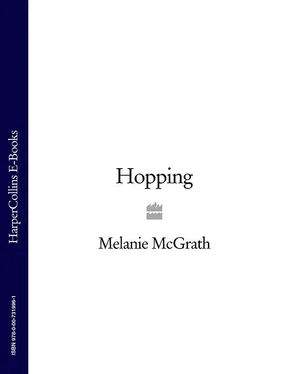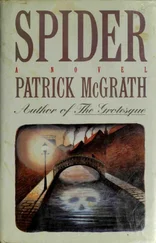If I’d only seen me twinnies laid in their boxes , she would say, I wouldn’t suffer these bonce aches, and this gnawing in me bones .
The arrival of Daisy, on 17 March 1903, as blue as a monkey’s arse , as Elsie put it, only seemed to remind Elsie of the loss she’d suffered.
The gel’s got her father’s elephant ears and doggy chops , Elsie would announce, cheerfully, to Mrs Shaunessy. Ain’t no one gonna mistake her for no Mona Lisa .
Oh, I don’t know about that, Mrs C , Mrs Shaunessy would reply. That gel of yours is a regular sweetheart. Good as gold, not a mean or nasty hair on her head .
Later, Elsie would complain to Joe about their neighbour.
I ain’t saying she ain’t good to us , Elsie would say, mustering her righteous indignation. But she should mind her p’s and q’s. I ask you, what kind of woman thinks she has the right to tell a mother about her own daughter?
Now, Else , Joe would say, hanging up his jacket and cap and sitting down for his tea, calm down, old gel, there’s plenty worse at sea .
Elsie would slap down her husband’s tea of brawn and boiled greens.
Like you’d know, Joe Crommelin , she’d say. What’s never bleedin’ been at sea but spouts so much sailor talk you’d think he was Sir Walter Bleedin’ Rally . Then she’d turn back to her daughter.
Eat your tea or the Sandeman’ll eat it for you .
The Sandeman lived in The Deep and sometimes spirited naughty children away. Whenever Daisy vexed her mother, Elsie would hold her head in her hands and swear that if Daisy didn’t start being good in short order, the Sandeman would appear and snatch her up and there wouldn’t be a thing Elsie or anyone else would be able to do about it.
When Franny came along, Elsie’s sourness softened, at least for a while. Daisy’s younger sister was a peach, with a head of light brown curls and dimpled little hands. When Elsie took Franny out in her pram, people would stop and coo and say what a darling baby she was and Elsie, endeavouring to look modest, would explain that she’d lost her twinnies and given birth to a plain girl, but Franny was proof that bad luck only ever ran in threes and her arrival had made up, at least in part, for Elsie’s earlier disappointments.
Sensing from early on the power her physical attributes gave her, Franny quickly developed an alarming determination to use them to her advantage. Though neither of her parents seemed to notice, Daisy realised early on that her sister was turning into a canny little manipulator, but in the light she brought with her Daisy could see Franny faintly illuminated a fragile path to Elsie’s heart, and she could not find it in herself to resent her sister. She was everyone’s darling.
Now Daisy walked along Bloomsbury Street in thin rain and stopped at the corner to wait for her best friend, Lilly Seldon. Elsie didn’t approve of the liaison, insisting that Lilly was as rough as pumice, but Elsie was like that about almost everyone Daisy showed an interest in.
Common is as common does , she’d say, but she did not prevent her daughter from seeing her friend. Lilly and Daisy had been friends since their third week at Culloden Street School, when Lilly had backed Daisy into a corner and asked her why her ears stuck out. Later, Lilly said she was sorry about the ears and that she herself had a big nose, and even though she wasn’t a Jew, she had often wondered where that had come from too.
’Ere , Lilly said, a penny says you can’t guess old Peasewell’s nickname . Miss Peasewell was the teacher who daily struggled to inculcate into her pupils a sense of respect for their betters, who numbered almost everyone.
I don’t know: Pease Puddin’? Daisy ventured, conscious that her future in some way depended on the answer.
Pease Puddin’? Lilly snorted. Pease Puddin’? What a doze you are . Pease Puddin’ ain’t a name .
Daisy shrugged and said she couldn’t think of any other name.
Pigswill, silly , said Lilly, landing a friendly punch on Daisy’s arm. Old Piggy Pigswill, ha ha ha . Then she looked up at Daisy and saw those ears and relented. I suppose Pease Puddin’ ain’t so bad, though, she said .
And after that, the two girls became the best of friends.
Four years of education had not served Daisy well and she often relied on Lilly to dig her out of the holes in her learning. She could read and write well enough to check a pawn ticket, though, or decipher the numbers on the tallyman’s chit, and she knew just by looking at the coins in her hand whether or not a trader had short-changed her; already she sensed that these skills were likely to be most of what she needed to reach the low horizons mapped out for girls like her. She would stay on at school until she reached twelve and join the half-and-half system, spending half her time at school and the other half working in a factory. A year or two later, if she was diligent and lucky, the factory might take her on full-time, or she might find work sewing collars and cuffs or wrapping bars of soap. If not, she would become one of the 30 per cent of working women who were forced to leave their homes and families and find work as domestic servants. She’d heard enough about life as a domestic from her mother to find the prospect terrifying: the slavish hours, the removal from family and friends and the complete dependence on the whims of strangers. She knew she wasn’t sharp like Lilly, but what she lacked in brains she determined to make up for in diligence. One day, she hoped Keiler’s or Peek Freans or some other factory would see how hard she applied herself and want to take her on.
At midday, she packed her slate and headed back home for her lunch. A warm, fatty smell greeted her at the door of number 7. Elsie was in the scullery shuffling the piles of drying laundry she had been washing all morning. It was no longer raining and Franny was shut outside in the yard with the dog. Elsie opened the door and called her in, then, making a space at the table, she slopped down two bowls of bacon barley soup and, announcing she had a bonce ache so bad it felt like a horse had kicked her in the head, went to lie down for a while.
Whenever the family needed a bit more money than usual, Elsie would keep Daisy back from school in the afternoons to help her with her flower-making. From one o’clock to six o’clock they would sit on the floor in the scullery, twisting and wiring and stringing, starching and curling, delicately painting spots and shadings on scraps of silk until what had been nothing more than a pile of brightly coloured fragments had been transformed into the silk irises, forget-me-nots, violets and roses that would adorn the hats of women and girls more fortunate than themselves. While they worked, Franny would be dispatched to Mrs Shaunessy, or sent to play in the yard, or, if the weather was bad and Mrs Shaunessy wasn’t in, locked in her room to prevent her from messing up the scraps of silk and delicate fixings.
It was piecework and poorly paid; on cold and damp days Elsie would complain that her finger joints knitted together and on warmer days the silk dust scratched at both their lungs and brought on bronchitis. By the end of the afternoon, their eyes were often so irritated by glue and fibres that they swelled and oozed with yellowish fluid. But there were worse jobs for the homeworker, like making matchboxes or stitching newly tanned leather for shoe soles, and, as Elsie liked to remind Daisy, there were plenty of women and children down in The Deep who were at that very moment busy doing them.
Читать дальше












